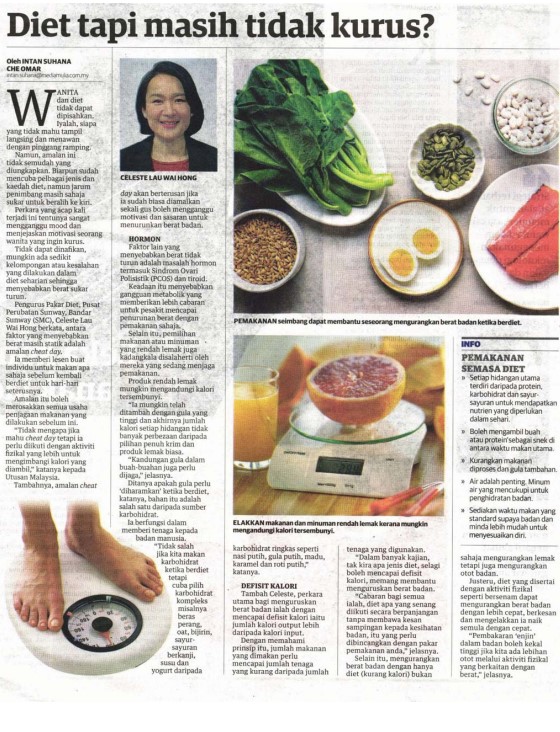Diet but Not Losing Weight?
19 December 2024

Women and the word diet are inseparable.
After all, what woman doesn’t want to appear slim and look stunning with a toned waistline?
However, dieting is not as easy as it sounds.
Even after trying various types and methods of dieting, the needle on the scale still seems reluctant to move to the left.
This recurring issue can significantly affect mood and demotivate a woman who is trying to lose weight.
It is undeniable that there may be some gaps or mistakes made in the daily diet, causing weight loss to be difficult.
Moreover, many may not realize the "mistakes" they are making.
Dietician Manager at Sunway Medical Centre, Sunway City (SMC), Celeste Lau Wai Hong, said that there are several factors that can cause weight to remain stagnant despite watching what you eat, one of which is the cheat day.
In simple terms, a cheat day refers to a day set by someone on a diet where they give themselves permission to eat whatever they want before returning to their diet the next day.
"One of the factors we often encounter in dietetic clinics is the practice of a cheat day.
The diet might be well-maintained on regular days, but a cheat day can undo all the effort by accumulating excess calories on that day, which carry over to the next day.
"Unless the cheat day is followed by more physical activity to balance the calories consumed, the weight will not change drastically," she told Utusan Malaysia.
She added that the continued practice of cheat days has become a habit, thus affecting one's motivation and goals to lose weight.
 Another factor that can prevent weight loss is hormonal issues.
Another factor that can prevent weight loss is hormonal issues.
For instance, conditions like Polycystic Ovary Syndrome (PCOS) or thyroid problems that cause metabolic disruptions create additional challenges for patients to lose weight through diet alone.
Additionally, the selection of low-fat foods or drinks is sometimes misunderstood by those who are managing their diet.
Low-fat products may contain hidden calories because low-fat does not necessarily mean low-calorie.
"It may have added sugar, and in the end, the calorie count per serving may not differ much from regular full-cream and fat products.
"The sugar content in fruits also needs to be monitored," she explained.
When asked whether sugar is completely "forbidden" during a diet, she said sugar is one of the sources of carbohydrates.
It is a primary energy source for the human body.
"It is not wrong to eat carbohydrates while dieting, but try to choose complex carbohydrates such as brown rice, oats, whole grains, starchy vegetables, milk, and yogurt over simple carbohydrates like white rice, white sugar, honey, caramel, and white bread," she said.
CALORIE DEFICIT
Celeste added that the key to managing weight is achieving an energy deficit, meaning that the calories expended are greater than the calories consumed.
"By understanding this principle, the amount of food consumed should provide less energy than the energy used.
"In many studies, no matter the type of diet, as long as it creates a calorie deficit, it helps in managing weight.
"The challenge for everyone is to find a diet that is easy to follow in the long term without causing negative side effects on health, which is what you should discuss with your nutritionist," she explained.
Additionally, losing weight through diet (caloric restriction) not only reduces fat but also muscle mass.
Therefore, a diet accompanied by physical activity such as exercise helps to reduce weight faster and can prevent rapid weight regain more effectively.
"Maintaining muscle mass can help maintain body metabolism, and the body's 'engine' can remain high if we have more muscle through weight-related physical activities," she explained.
Source: Utusan Malaysia
Back




